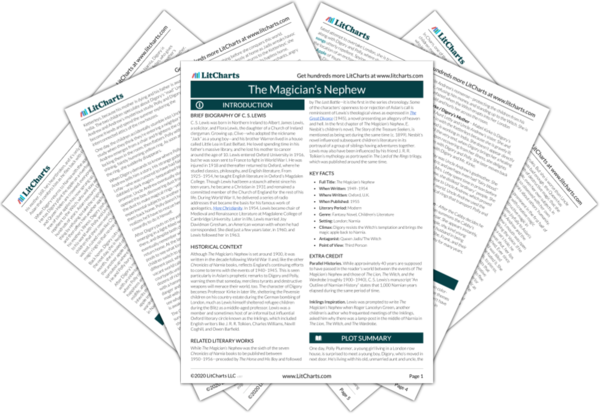Narnian apples have the power to bestow unending life—a tempting prospect that reveals the selfishness or unselfishness of characters’ hearts. Therefore, apples symbolize the choice to serve others or to satisfy oneself. After Digory releases the Witch from enchantment, allowing her evil to infiltrate Narnia, Aslan commands Digory to undo the harm he’s caused by journeying to a remote garden and retrieving a magical silver apple. When Digory does so, he discovers that the Witch has beat him there. She eats one of the apples herself, obtaining endless life, and tempts Digory to steal an apple to save his ailing mother. Digory ultimately refuses and brings his apple back to Narnia, where it’s planted to become a protective tree for the creatures there. Because of his obedience, Digory is allowed to pick another apple to take back to London. Though its magic isn’t as potent in the “ordinary” world, it does heal Digory’s mother’s illness, suggesting that a selfless sacrifice in the short term will ultimately pay off in the long term.
Apple Quotes in The Magician’s Nephew
He knew which was the right tree at once, partly because it stood in the very center and partly because the great silver apples with which it was loaded shone so and cast a light of their own down on the shadowy places where the sunlight did not reach. He walked straight across to it, picked an apple, and put it in the breast pocket of his Norfolk jacket. But he couldn’t help looking at it and smelling it before he put it away.
It would have been better if he had not. A terrible thirst and hunger came over him and a longing to taste that fruit. He put it hastily into his pocket; but there were plenty of others. Could it be wrong to taste one? After all, he thought, the notice on the gate might not have been exactly an order; it might have been only a piece of advice—and who cares about advice? Or even if it were an order, would he be disobeying it by eating an apple? He had already obeyed the part about taking one “for others.”

Unlock explanations and citation info for this and every other The Magician’s Nephew quote.
Plus so much more...
Get LitCharts A+









